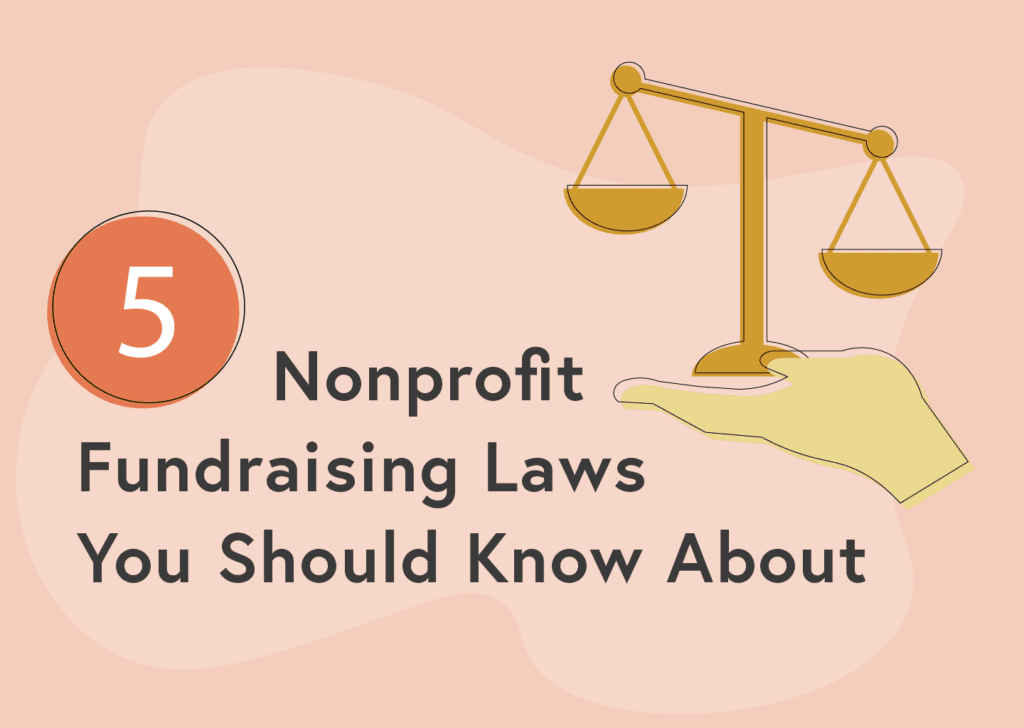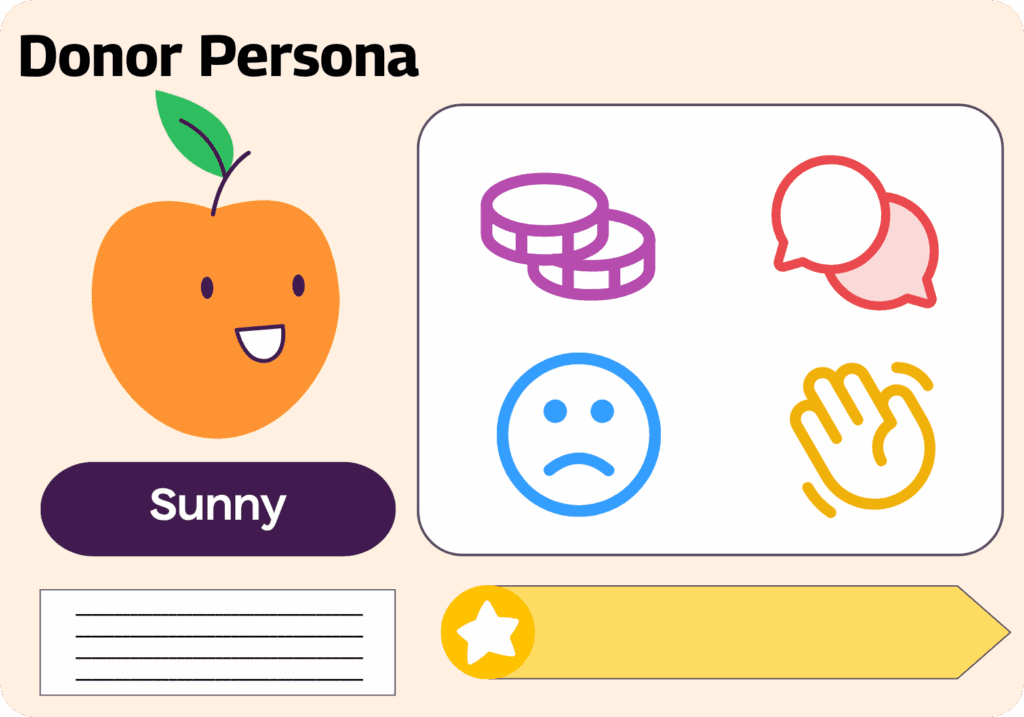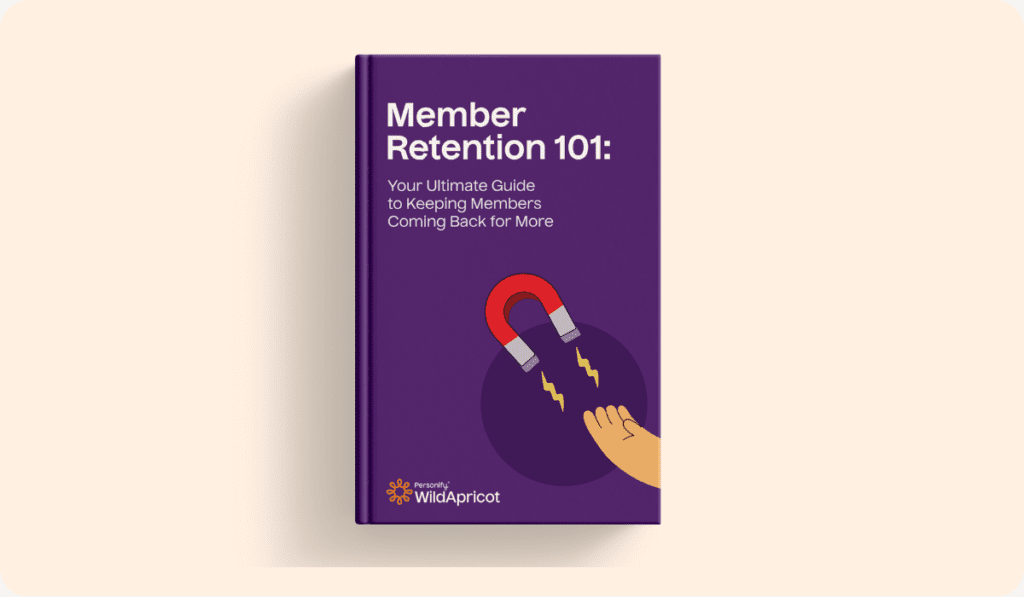Fundraising is the lifeblood of every nonprofit organization. Thanks to state and federal regulations and tax exemptions, qualified nonprofits can pour the vast majority of earnings into their cause. But nonprofit laws can be confusing, and failing to follow the rules can result in hefty penalties.
To help you stay compliant, we’ll dive into five types of nonprofit fundraising laws every charitable organization in the US should be familiar with while raising money.
We’ll be covering:
1. Regulations for 501(c)(3) Organizations
2. Regulations for Fundraising Events
3. 2020 IRS Inflation Adjusted Rates for Nonprofits
4. Regulations for Email and Anti-Spam Laws
5. Regulations for Donation Receipts
1. Regulations for 501(c)(3) Organizations
501(c)(3) is a section of the U.S. Internal Revenue Code that gives nonprofit organizations federal tax exemption.
Earning a 501(c)(3) determination means that a nonprofit has been approved by the Internal Revenue Service (IRS) as a tax-exempt, charitable organization. It applies specifically to those that are considered public charities, private foundations, and private operating foundations.
501(c)(3) Requirements
To qualify as a 501(c)(3) organization, a nonprofit must exist for one or more of these charitable purposes:
- Religious
- Scientific
- Charitable
- Testing for public safety
- Literary
- Educational
- Animal or child cruelty prevention
- Fostering amateur sports competition
Beyond serving the charitable purposes listed above, a nonprofit must meet several other requirements to qualify:
- It must be organized and operated for exempt purposes only.
- It can make a profit, but that profit must support charitable purposes only. Net earnings cannot benefit private shareholders or individuals.
- It is restricted in its political and lobbying activities.
Tax Benefits of Being a 501(c)(3) Organization
One of the most notable benefits of earning 501(c)(3) status is that it allows donors to write off donations for federal income tax purposes. Many states also allow donors to deduct charitable gifts for state income tax purposes.
Perks that benefit nonprofits directly include:
- The ability to receive grants from private foundations and the government
- Exemption from many federal, state, and local taxes
- Special bulk postage discounts and nonprofit advertising rates
- Limited protection from lawsuits
Tax Regulations of Being a 501(c)(3) Organization – UBIT
Tax benefits are an obvious advantage to becoming a 501(c)(3) organization — but qualified organizations should also be aware of tax regulations they need to adhere to.
As a registered charitable organization, you’ll need to pay taxes on any unrelated business income.
That means, if you earn money through activities that fall outside of your tax-exempt purposes, generally pertaining to commercial activities. Under IRS rules, this is referred to as UBIT (Unrelated Business Income Taxation)
So how do you know whether you need to pay UBIT?
For most organizations, an activity is an unrelated business, and subject to UBIT, if it meets three requirements:
- It is a trade or business,
- It is regularly carried on, and
- It is not substantially related to furthering the exempt purpose of the organization.
While this may make it sound like all your income streams could pose a serious risk, there’s no need to clear your annual fundraising calendar just yet. Currently, there’s a monetary grace range of under $1,000 for UBIT. Although, if your organization has banked more than $1,000 in gross income from unrelated business ventures, you will need to file Form 990-T. Additionally, you must also pay quarterly on estimated taxes if you expect your UBIT to exceed $500 for the year.
There are some exceptions, though. You won’t have to pay UBIT on the following:
- The sale of donated property – For example, say your nonprofit runs a bake sale and supporters donate baked goods to raise funds on your behalf. As long as the goods have been donated, then the UBIT does not apply.
- Unpaid volunteer work – Similar to donated property, if volunteers choose to donate their time and effort, then any funds raised on your organization’s behalf would be UBIT-free.
- Convenience initiatives – If your nonprofit operates on the basis of convenience for your members (students, officers, nurses, patients etc), UBIT will not apply for regularly carried on commercial businesses. For example, a school cafeteria raises money outside of the educational component that you were registered for, however, since it primarily operates for the convenience of your students, the income raised will be tax-exempt.
While this can be a bit of a grey area, it’s important to remember that as long as you’re limiting the service to what is necessary then you will be UBIT-exempt. For example, if you open a Michelin Star restaurant in your school cafeteria and service members outside of your organization’s impact community, then income from outside members will be taxed. You can also learn more about UBIT exclusions here.
2. Regulations for Fundraising Events
Fundraising events are a great way to raise money and get supporters involved in your cause. But before you start planning a casino night or auction, you should know that certain types of fundraising events come with strict laws attached. Violating 501c3 regulations can come with steep penalties.
Fundraising activities are primarily regulated at the state level, so you’ll need to research specific laws for each state you operate in to maintain compliance.
One category of fundraising events that are highly regulated (and even illegal in a few states) is “games of chance.” Events that fall under this category include:
- Raffles
- Auctions
- Gambling and gaming (Bingo, poker tournaments, etc.)
Even an auction that is raising money for a charitable cause can result in unintended consequences unless you’re familiar with the regulations. Here’s what you need to know.
Know Your State Rules
Look up whether your state allows charitable nonprofits to hold raffles, auctions, and other games of chance. If it does, your nonprofit will need to apply for a state license. Currently, 41 states plus the District of Columbia require a state license for charitable gaming events.
Here are some additional issues to consider when planning a fundraising event:
- Income from games of chance events could be considered unrelated business income, in which the nonprofit would owe tax on the income. Winners may also owe tax that the nonprofit is required to withhold. Read more about tax withholding and reporting requirements here.
- If you plan to host an event where alcohol is served, like a casino night, you may need a separate alcohol license.
- In some states (e.g., Pennsylvania), the proceeds you earn from games of chance must be kept in a special bank account.
- A nonprofit might be subject to gaming excise taxes for certain types of contests or lotteries. Check out IRS Publication 3079 for more information.
Understand What Is (And Isn’t) Deductible
You may be surprised to learn that “contributions” given at an auction or game of chance are not tax-deductible, even when the event is put on by a charitable organization.
The reason is that the contribution is actually a payment for donated goods or a donated experience, such as an all-expenses-paid vacation. Consequently, the donor didn’t provide the charity with a contribution that exceeds the fair market value of what they received.
Read More:How to Host a Successful Virtual Fundraiser for Your Nonprofit
3. 2020 IRS Inflation Adjusted Rates for Nonprofits
The IRS recently announced new, inflation-adjusted rates and limits for 2020. Here are the details that apply to nonprofits:
Low-Cost Articles
The Internal Revenue Code excludes proceeds from the distribution of “low-cost articles,” which are items provided in appreciation for a charitable donation. Examples include mugs, stickers, T-shirts, and other similar items.
The monetary value of a low-cost article is tied to inflation, so it changes every year. For the 2020 tax year, a low-cost article is defined as an article that costs $11.20 or less – an increase of 10 cents from last year.
Other Insubstantial Benefits
The IRS has also ruled that donors who receive something in return for their donations (a quid-pro-quo gift) may still deduct the entire amount donated if:
- For a contribution equal to or greater than $25, the contributor did not receive something in return that costs more than $5 or the rate of a “low-cost article” as described above, or:
- The fair market value of all the benefits provided to the donor in connection with the donation is not more than 2% of the amount donated or $50 – whichever is less.
The $5/$25/$50 amounts are adjusted annually to keep up with inflation. For the 2020 tax year, the insubstantial benefit amounts have been increased to $11.20, $56, and $112, respectively.
4. Regulations for Email and Anti-Spam Laws
Email is one of the best tools for staying connected with donors and volunteers — but there’s a fine line between communicating valuable information and sending unwanted spam.
Data privacy and security are highly regulated, which means nonprofits need to be extra careful to follow email and anti-spam laws when communicating with supporters.
(It also means that buying email lists or phone numbers is a huge no-no.)
Three of the most important communication laws to know about are the CAN-SPAM Act and GDPR.
CAN-SPAM Act
The CAN-SPAM Act protects consumers from receiving emails they never consented to receive.
It applies primarily to commercial email, but nonprofits are not exempt, especially if you market products for purchase or involve a corporate sponsor in any email communications.
To comply with CAN-SPAM, you need to verify subscribers have opted in before emailing them. You must also provide a clear and conspicuous notice in every email that allows recipients to opt out.
General Data Protection Regulations (GDPR)
GDPR is a set of privacy and security laws that were enacted by the European Union (EU) in 2018. It sets stringent rules and expectations that protect EU citizens’ personal data.
Nonprofits collect a lot of personal data, such as names, addresses, and emails. GDPR applies to nonprofits that collect or store website behavior or any personal data about an EU resident, such as donors, members, grantors, or grantees.
Even if your nonprofit is based in the U.S. and only serves or fundraises from U.S.-based individuals, you may still need to comply with GDPR. For example, if an EU resident visits your website and subscribes to your newsletter because they’re interested in your cause, the GDPR will automatically kick in.
To avoid hefty fines, it’s better to err on the side of caution and take measures to ensure your nonprofit is compliant with GDPR.
California Consumer Privacy Act (CCPA)
CCPA is similar to GDPR standards. It applies to any company that collects or provides the personal information of California residents and meets one or more of the following criteria
- Has $25 million or more in annual sales
- Buys, sells, or shares information on 50,000 or more individuals, households, or devices
- Derives more than half of its annual revenue from selling personal information
Since the population of California is sitting around 39.5 million (more than the population of Canada!), it’s best to pay attention to this state law which came into effect on January 1, 2020.
Although nonprofits are exempt, if you use any data marketing sources, you need to ensure those third party vendors are compliant. As the CCPA provides Californians with four basic privacy rights –
- The right to know
- The right to opt out
- The right to control and be forgotten
- The Right to Exercise Privacy Rights Without Prejudice
– nonprofit organizations should expect a change in expectation in supporters for how their private data is handled. We expect donors to be looking for more control and transparency into how you use their data. To ensure you maintain a trusting relationship with your donors, be prepared to answer any questions open and honestly.
Read More:The Essential Guide to Nonprofit Email Marketing
5. Regulations for Donation Receipts
Donation receipts are written records that verify a gift was made to an organization with proper legal status, such as a registered 501(c)(3) nonprofit.
For donations made in the US, donors need a written acknowledgment, such as a donation receipt, to claim tax returns for single contributions of $250 or more. However, in general, it’s always a good idea to send donation receipts.
Donation receipts can be a pain to create and manage, but they’re extremely important for individuals and businesses that donate to your organization. Without official written confirmation, donors cannot claim tax deductions.
There is no standard format for donation receipts, so you can choose to send letters, postcards, or digital receipts. But there are some elements you always need to include on your donation receipts.
In the U.S., a donation receipt must include:
- Name of your organization
- Donor name
- Cash contribution amount
- Description of any non-cash contribution (if applicable)
- Statement that no goods or services were provided by the organization (if applicable)
- Description and estimate of the value of goods or services that the organization provided in return for the contribution
- Statement that any goods or services that the organization provided in return consisted entirely of intangible religious benefits (if applicable)
Getting into the routine of sending tax receipts is a great way to build positive, lasting relationships with your donors.
Tip: When you send out donation receipts, include a personal thank-you letter. Receipts tend to be very transactional, so throwing in an appreciative gesture helps transform an administrative necessity into an opportunity to build goodwill.
Read More:Everything You Need to Know About Charitable Donation Receipts
The sheer quantity of nonprofit fundraising laws out there can seem daunting at first. But remember that they exist to protect your organization and supporters. Following these laws will allow you to establish trust with your donors, raise more money, and do more good.
This article is provided as a resource, but it’s not legal advice. We encourage you to speak to legal counsel in your area to learn how various tax, privacy, and anti-spam regulations and laws may apply to your organization.
 A storyteller by nature and an organizer by inheritance, Sam enjoys crafting meaningful content equally as much as colour coding spreadsheets. As Keela‘s Marketing Director, she is always on the hunt for new and innovative ways to educate nonprofits and help them maximize their impact.
A storyteller by nature and an organizer by inheritance, Sam enjoys crafting meaningful content equally as much as colour coding spreadsheets. As Keela‘s Marketing Director, she is always on the hunt for new and innovative ways to educate nonprofits and help them maximize their impact.








